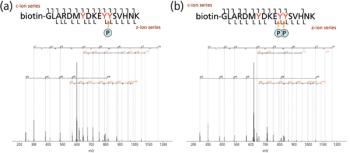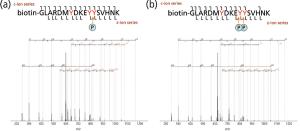
Successful characterization of protein posttranslational modifications (PTMs) is critical to our understanding of many biological processes. Unfortunately, attempts to describe PTMs often prove experimentally difficult and result in ambiguous conclusions. As technologies in the field of mass spectrometry (MS) continue to improve, people are turning increasingly to mass spectral techniques for PTM characterization. Recently, novel modes of peptide fragmentation have emerged that are giving scientists greater ability to elucidate protein posttranslational modification. One example is electron-capture dissociation (ECD), an alternative fragmentation mechanism for use in peptide analysis via tandem mass spectrometry. ECD selectively cleaves N-Cα bonds of the peptide backbone, yielding c- and z-ions without the loss of labile PTMs. ECD therefore holds advantages over conventional fragmentation techniques such as collisionally induced dissociation (CID), which often cleave PTMs from the peptide backbone,..

